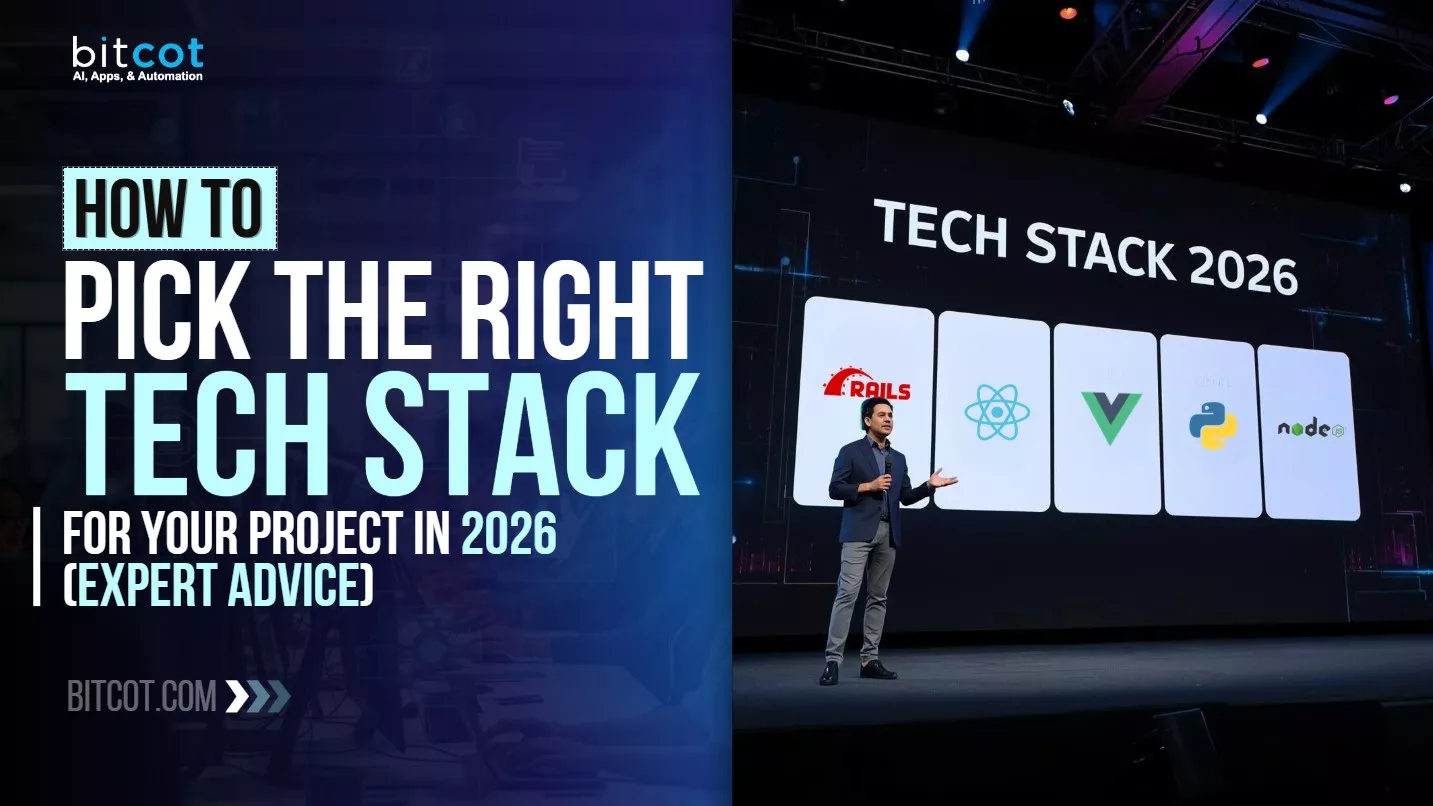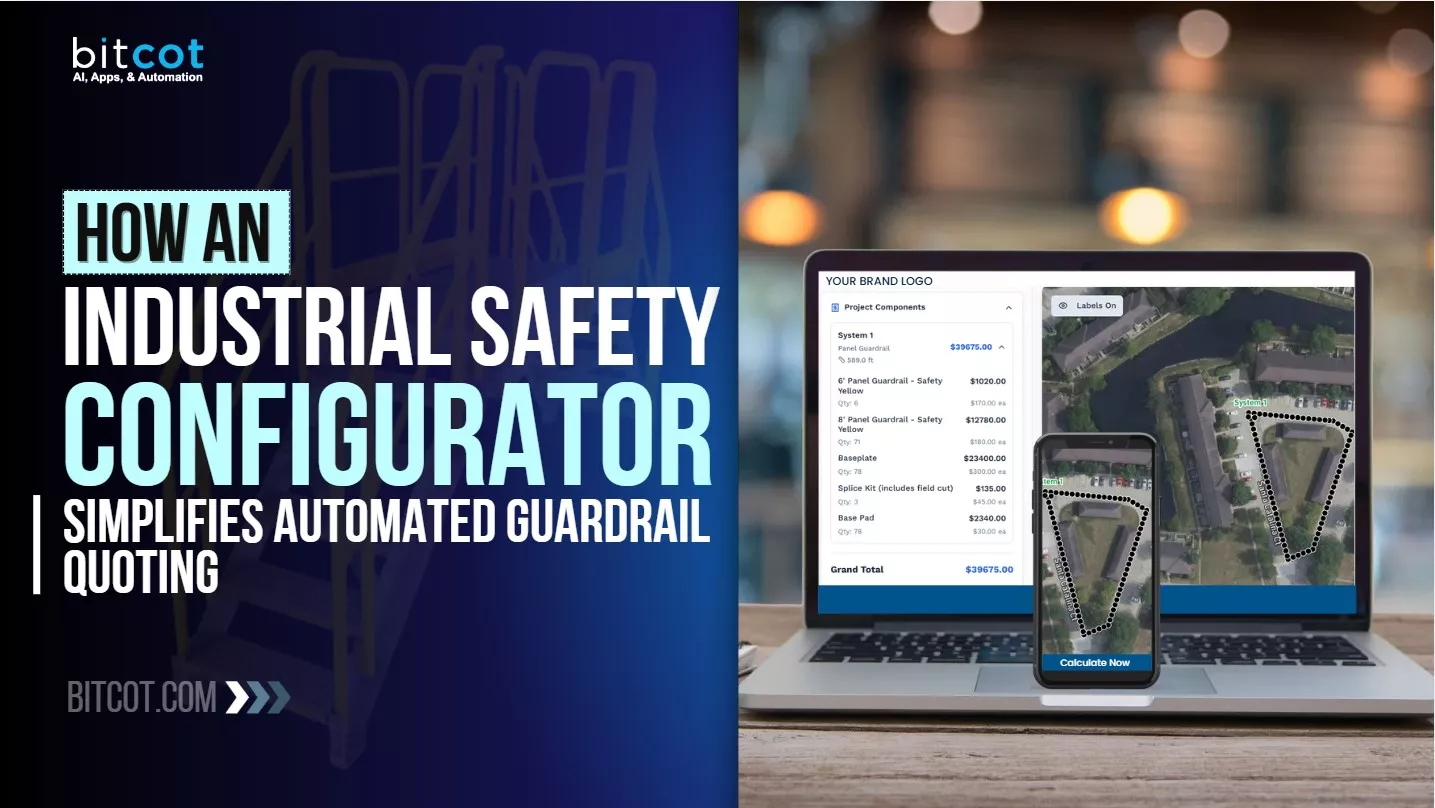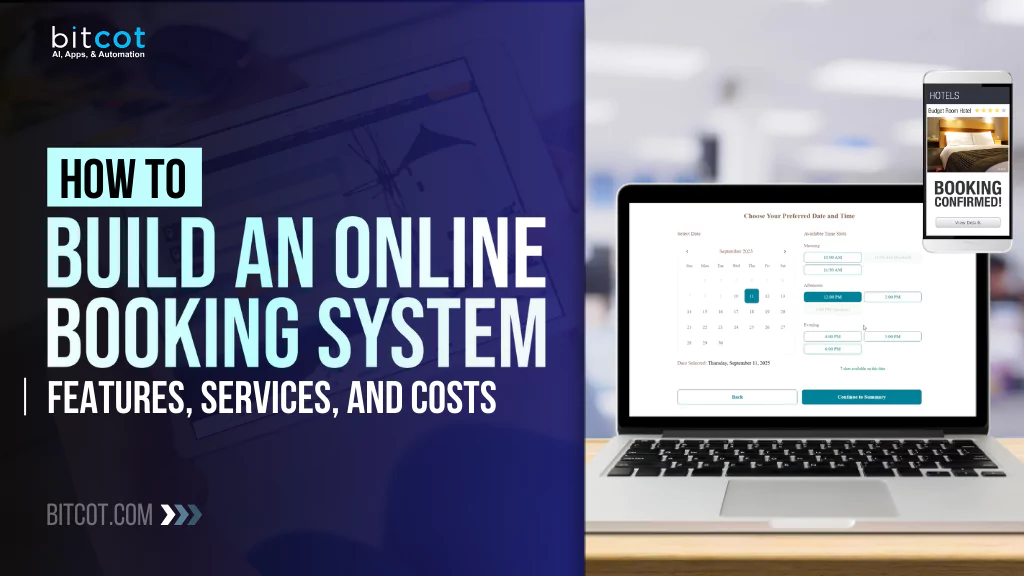
Think about how much the world has changed in the last decade. Customers no longer want to wait on hold to make an appointment, send emails back and forth to confirm availability, or show up somewhere only to find out it’s fully booked.
Today, people expect to book a table at a trendy Los Angeles restaurant, schedule a haircut in San Francisco, reserve a hotel room in San Diego, or grab concert tickets for a show in Sacramento with just a few taps on their phone.
For business owners across California, this shift creates both a challenge and an opportunity. The challenge? Keeping up with fast-changing customer expectations. The opportunity? Leveraging booking system development to not only simplify the reservation process but also save time, reduce no-shows, and boost revenue.
From small local service providers to large enterprises with global reach, booking platform development has become an essential part of modern business.
Whether you’re building a booking app for a restaurant, a medical practice, or a travel company, understanding how these systems work, the features customers expect, the different types of reservation platforms available, and the costs involved is critical.
In this guide, we’ll explore everything you need to know about booking software development, so you can make informed decisions about creating a system that fits your business, your customers, and your growth goals.
What is an Online Booking System?

An online booking system is a digital platform that automates the reservation process for customers and businesses.
Instead of calling to check availability, waiting for confirmation emails, or manually tracking appointments in a paper calendar, customers can book what they need instantly, whether it’s a haircut, a hotel room, a yoga class, or even a medical consultation.
At its simplest, an online booking system works like this: a customer visits your website or mobile app, checks available time slots, selects a service, confirms their details, and makes a payment (if required). The system then automatically updates the schedule, sends out confirmation notifications, and may even issue reminders before the appointment or service date. It’s fast, accurate, and convenient.
But why does this matter so much?
The short answer: customer expectations have changed. Today’s customers want on-demand services, and they’re used to the convenience of apps like Airbnb, OpenTable, and Uber. If your business doesn’t offer a quick, seamless booking experience, there’s a good chance potential customers will go to a competitor who does.
For businesses, the benefits are just as important. Online booking systems reduce no-shows through automated reminders, minimize scheduling errors, free up staff from repetitive admin tasks, and provide valuable data on customer behavior.
For example, a salon in Sacramento might notice which services are most popular on weekends, or a fitness studio in Oakland could see when classes are in highest demand. With that information, businesses can make smarter decisions about staffing, pricing, and promotions.
Whether you’re a local restaurant, a healthcare clinic, a hotel, or even an event organizer, investing in booking platform development isn’t just about keeping up with technology; it’s about creating a smoother, more reliable experience for your customers while making your operations more efficient.
Key Features of an Online Booking System
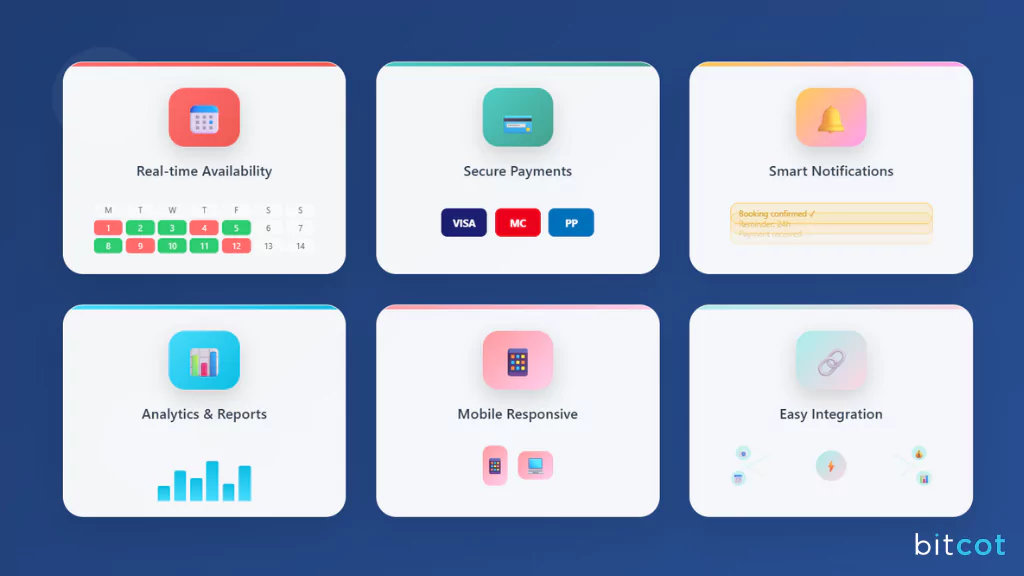
When building a booking platform, the features you include will determine how well it serves both customers and staff.
A great system should be convenient, secure, and scalable.
Below are the essential features that every booking software development project should consider for long-term success.
1. Real-Time Availability
Real-time availability ensures customers can instantly see what’s open and confirm bookings without delays or guesswork. This is particularly crucial for businesses in high-demand areas like Santa Ana’s business district or San Jose’s tech corridor. It eliminates double-bookings and scheduling conflicts that frustrate both staff and clients.
2. Calendar Integration
A system that syncs with Google, Outlook, or Apple calendars makes scheduling much easier for both sides. Staff can see appointments in one place without manually updating multiple systems. Customers can add bookings to personal calendars for quick reminders. This creates a smooth, connected experience where fewer appointments are overlooked.
3. Secure Payment Processing
Online payments are now an expectation, not a luxury, when customers make a booking. Integrated gateways like Stripe, PayPal, or Square ensure transactions are safe, fast, and reliable. Businesses also reduce the risk of no-shows when deposits are required. Offering cards, bank transfers, or digital wallets adds flexibility that keeps customers happy.
4. Automated Notifications & Reminders
Customers value clear communication before and after their bookings. Automated confirmations, reminders, and even follow-up emails keep them engaged. These reminders reduce missed appointments, saving businesses time and money. By automating outreach, staff can focus on customer service rather than repetitive calls and emails.
5. Mobile-Friendly Experience
Since most people book services on their phones, mobile responsiveness is non-negotiable. A system that works seamlessly across devices ensures customers can book anytime, anywhere. Some businesses even build dedicated apps for an added branded experience. A mobile-first approach boosts accessibility, convenience, and overall customer satisfaction.
6. User-Friendly Dashboard for Staff
Behind the scenes, staff need tools that are clear, fast, and easy to use daily. A well-designed dashboard simplifies scheduling, rescheduling, and cancellations in just a few clicks. Multi-user support is essential for businesses with multiple staff or branches. By removing complexity, the dashboard empowers employees to serve customers better.
7. Customer Profiles and History
Modern booking systems act like lightweight CRMs by storing customer data securely. Profiles may include booking history, preferences, and payment records. This allows staff to personalize service, like recalling a guest’s favorite table or a client’s go-to treatment. Personalization strengthens loyalty, encouraging customers to return again and again.
8. Analytics and Reporting
Strong reporting tools turn bookings into business intelligence, helping California businesses understand local market trends from Modesto to Irvine. Insights might reveal your busiest times, most popular services, or highest-value customers. Businesses can then optimize staffing, pricing, or promotions around these trends.
9. Multi-Language and Multi-Currency Support
If you serve international or diverse communities, accessibility is key. Language options allow more customers to book confidently without translation issues. Multi-currency support helps global travelers pay in the way they prefer. These features are vital for hotels, tour companies, and other businesses with an international audience.
10. Integration with Third-Party Tools
Your booking system should connect with the tools your business already uses. Integrations with CRM software, marketing platforms, or accounting tools save time and prevent duplicate work. A connected system also creates smoother workflows across departments. The more integrated your booking platform is, the more valuable it becomes over time.
Types of Services in Online Booking Software Development
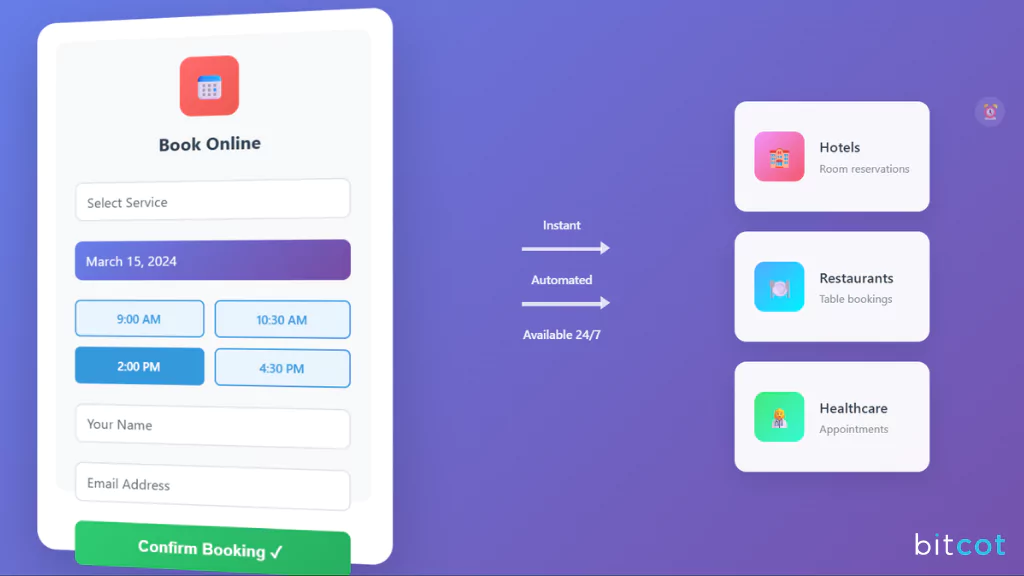
Not all booking platforms are created equal; different industries require different solutions.
When considering reservation systems development, it’s important to identify which type of system fits your business best.
Below are the most common booking systems used today, each designed to solve unique needs and challenges.
Hotel and Hospitality Booking Systems
Hotels, resorts, and vacation rentals rely on systems that manage rooms, rates, and availability in real time. These platforms often integrate with travel sites like Booking.com or Airbnb to reach wider audiences. Features like cancellations, upgrades, and flexible pricing are crucial in hospitality. A reliable system keeps occupancy rates high and customer satisfaction even higher.
Healthcare Appointment Systems
Medical clinics, dentists, and wellness centers use booking apps to streamline patient scheduling. These systems often include features like patient reminders, digital forms, and telehealth integrations. By reducing wait times and missed appointments, providers improve efficiency and patient care. Security is also critical to protect sensitive health data.
Event and Ticketing Platforms
From concerts and festivals to conferences and workshops, events depend on ticketing systems to manage reservations. These platforms handle seat selection, digital ticket delivery, and even on-site check-ins for venues across Anaheim, Long Beach, and beyond. Many also integrate with marketing tools to promote events more effectively throughout California’s entertainment industry.
Membership and Subscription Booking Systems
Membership-based platforms focus on recurring access, subscriptions, and tiered plans. Gyms, coworking spaces, clubs, or subscription services can manage recurring payments, bookings, and member benefits in one system. These platforms automate renewals, cancellations, and usage tracking. Membership systems improve retention while simplifying operations for recurring services.
Restaurant Reservation Systems
Restaurants and cafés benefit from reservation platforms that simplify table management. Customers can book tables directly online, reducing call volume and improving efficiency. Features like waitlists, table layouts, and no-show tracking keep operations smooth. A polished system helps restaurants maximize covers and enhance customer dining experiences.
Salon and Spa Booking Systems
Salons, barbershops, and spas rely on booking systems tailored for individual appointments. Customers can choose preferred staff, services, and time slots with ease. These systems often track client history, such as past treatments or product preferences. Personalized experiences lead to stronger client relationships and repeat visits.
Fitness and Sports Booking Systems
Gyms, yoga studios, and sports facilities often use class or session-based booking systems. Customers can reserve spots for group classes, book personal training, or rent sports facilities. Automated waitlists ensure spaces are filled if someone cancels last minute. This helps maximize capacity while keeping members engaged and satisfied.
Travel and Tour Booking Systems
Travel agencies and tour operators use booking platforms to manage itineraries, packages, and group reservations. These systems often support multiple services like flights, accommodations, and activities. Features like dynamic pricing and multilingual options are essential for global travelers. A strong system ensures seamless coordination across different vendors.
Education and Training Booking Systems
Schools, training centers, and tutors use booking platforms to schedule classes, workshops, or one-on-one sessions. These systems allow students to book courses and manage attendance easily. Many also integrate with e-learning tools or video conferencing platforms. This makes them perfect for both in-person and online education providers.
Transportation Booking Systems
Ride-hailing companies, bus operators, and car rental services all rely on booking software. These platforms manage vehicle availability, seat selection, and payment in one place. GPS integration and real-time tracking are often included for convenience. A reliable system improves safety, customer trust, and operational efficiency.
How to Build an Online Booking System
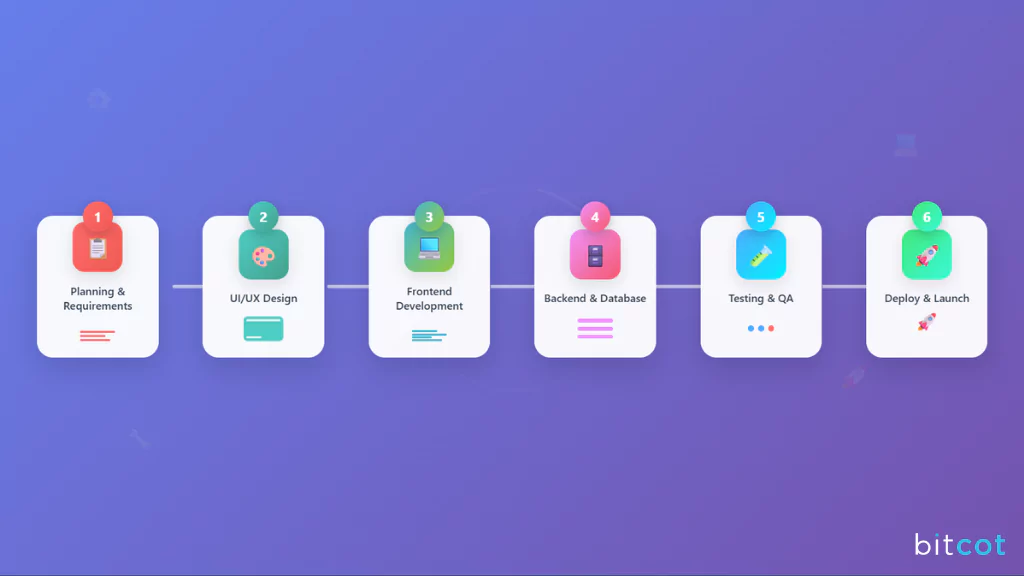
Building an online booking system might sound complicated, but it’s really about understanding your business, your customers, and the technology that can connect them efficiently.
A well-built system does more than just schedule appointments; it saves time, reduces errors, increases revenue, and enhances customer satisfaction.
Here’s a detailed roadmap to guide you through the process:
Step 1: Analyze Your Business Needs
Before touching any software, fully understand how your business operates. Are you managing one-on-one appointments, group classes, hotel rooms, or recurring memberships? Identify pain points in your current process: double bookings, missed appointments, or payment delays. This stage sets the foundation for a system that actually solves real problems rather than creating more work.
Step 2: Define Essential Features
Once you know your needs, outline the features your system requires. Core features often include real-time availability, automated reminders, secure online payments, reporting dashboards, and calendar integrations. For more advanced setups, consider AI-powered recommendations, multi-location support, customer profiles, and membership management.
Step 3: Plan for Integrations
A successful booking system rarely operates in isolation. It should integrate with the tools your business already uses, such as CRM platforms, marketing automation, payment gateways, email systems, and calendar apps. Proper planning here ensures that data flows seamlessly, reduces manual work, and prevents operational bottlenecks. Skipping this step can lead to headaches later.
Step 4: Design a User-Friendly Interface
Customer experience matters just as much as functionality. Your platform should be intuitive for both customers and staff. Simple navigation, quick booking flows, and mobile responsiveness are crucial. Staff dashboards should allow easy management of appointments, cancellations, and resources. A clean, user-focused design reduces errors, prevents frustration, and encourages repeat bookings.
Step 5: Choose the Right Development Approach
Decide whether you will build in-house, hire a dedicated team, or partner with a development company like Bitcot. Custom development gives you flexibility to include unique workflows and branding, while off-the-shelf solutions may be quicker but less adaptable. Ensure your developers have experience with appointment scheduling for the best results.
Step 6: Develop, Test, and Iterate
Once development starts, focus on creating a secure, scalable, and reliable platform. Test extensively for usability, performance, and edge cases, such as simultaneous bookings or payment failures. Iterative testing ensures your system works under real-world conditions. Include both staff and customer feedback during testing to catch issues early and improve the final product.
Step 7: Launch Strategically
Going live isn’t just about flipping a switch. Prepare your team with training, create guides for customers, and consider a soft launch or pilot phase to identify issues before full deployment. Communicate clearly with your customers about how to use the new system. A well-planned launch maximizes adoption and reduces confusion.
Step 8: Monitor Performance and Gather Feedback
After launch, monitor system usage, track metrics like booking completion rates, cancellations, and customer satisfaction. Regularly gather feedback from staff and customers to uncover pain points or missing functionality. Continuous improvement ensures your platform remains efficient, user-friendly, and aligned with your business goals.
Step 9: Maintain and Scale Over Time
Technology and customer expectations evolve, so ongoing maintenance is critical. Schedule updates, security patches, and new feature development. As your business grows, scale your system to handle more users, locations, or services. A well-maintained booking platform grows with your business instead of becoming a bottleneck.
Also Read – Top 10 Online Booking System Development Companies in the USA
Cost Factors in Booking Platform Development
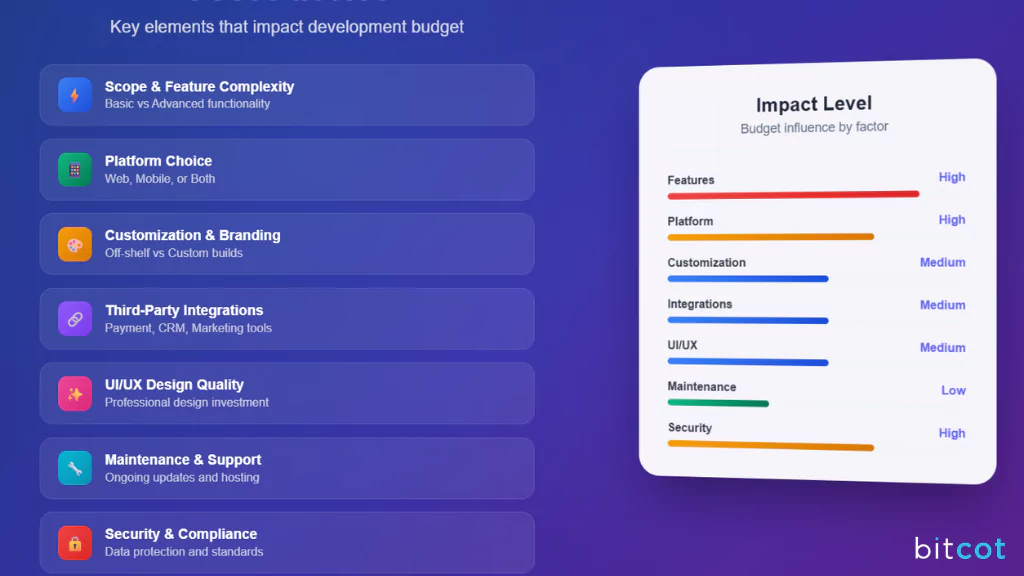
The cost of booking system development depends on a range of variables, from the complexity of features to the level of customization.
A simple web-based solution will naturally cost less than a fully integrated booking app with analytics, automation, and third-party integrations.
Here are the most important cost factors to consider.
1. Scope and Complexity of Features
The more features you need, the higher the cost of development becomes overall. Basic systems with scheduling and confirmations are much cheaper to build. Adding advanced features like AI recommendations, dynamic pricing, or multi-location support raises costs significantly. Each extra layer requires more coding, testing, and design expertise.
2. Platform Choice (Web, Mobile, or Both)
Choosing to build only a web-based platform is the most affordable option for many businesses. However, mobile apps for iOS and Android greatly expand customer accessibility. Developing for both web and mobile requires separate builds and testing cycles. While costlier, this approach ensures maximum reach and engagement.
3. Customization and Branding
Off-the-shelf booking tools are quick to launch but offer limited flexibility for growth. Custom-built systems with tailored workflows, branding, and unique features are more expensive upfront. They allow businesses to stand out and align perfectly with customer needs. Customization also makes scaling easier as the company grows.
4. Third-Party Integrations
Integrations connect the booking system with tools like payment gateways, CRMs, and marketing platforms. Each integration requires additional development time and testing for compatibility. The more integrations you request, the higher the overall project costs. However, these tools greatly improve efficiency and user experience.
5. User Interface and Experience (UI/UX)
A well-designed interface creates smoother interactions and reduces booking abandonment. Investing in professional UI/UX design services raises the upfront cost of development. Clean layouts, fast load times, and intuitive navigation boost customer satisfaction. In the long run, design quality often pays for itself through higher retention.
6. Maintenance and Ongoing Support
After launch, businesses must budget for ongoing costs to keep systems running. Updates, bug fixes, and server hosting are recurring expenses that add up. Technical support ensures the system remains reliable for staff and customers alike. Without maintenance, the platform risks downtime and poor performance.
7. Security and Compliance
Booking systems often store sensitive customer and payment information securely. Strong security protocols like data encryption and PCI compliance are essential investments. Healthcare platforms may also need HIPAA compliance, which raises development costs. Prioritizing security early prevents data breaches that could be far more costly later.
Partner with Bitcot to Build Your Booking System
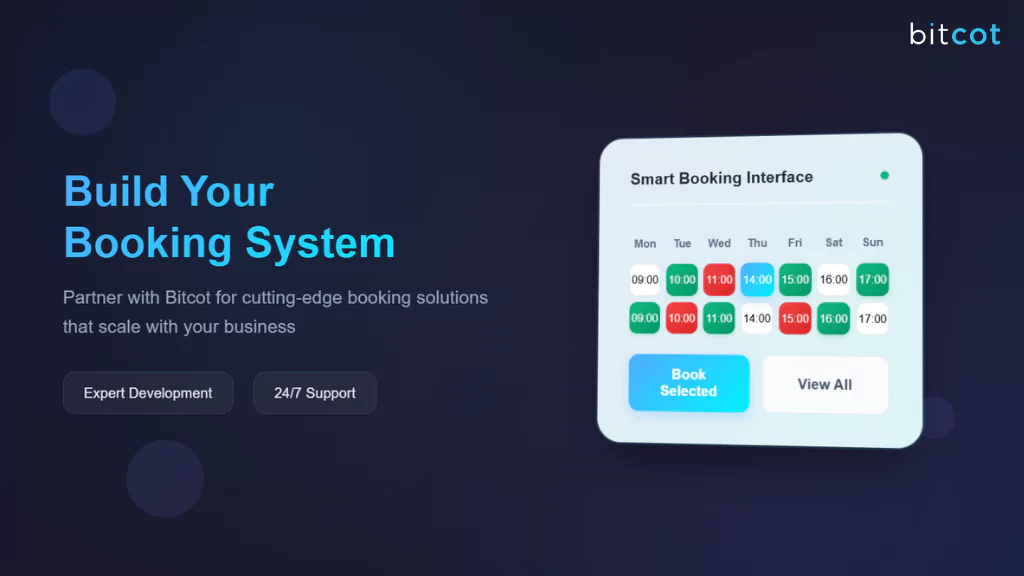
Here’s the thing: building a booking system isn’t just about getting software up and running. It’s about creating something that actually makes life easier for your team and your customers.
At Bitcot, we’ve helped businesses from hotels to clinics and fitness studios build platforms that don’t just “work” but actually solve problems.
Think of us less like developers-for-hire and more like a partner who rolls up their sleeves and figures out what will move the needle for your business. We don’t believe in cookie-cutter solutions, because your workflow isn’t cookie-cutter. We take the time to understand your needs, then build something that fits like a glove.
It’s this personal attention that sets us apart; our recent case studies show how we’ve helped businesses optimize their service booking software and achieve real, measurable results.
Here’s what working with Bitcot really looks like:
- Custom systems that fit your business: Whether you run a restaurant in Los Angeles or a wellness studio in San Diego, your booking process is unique. We design software that mirrors the way you operate, so your team isn’t stuck wrestling with clunky tools.
- Smooth integrations with the tools you already use: Nobody wants to juggle five different systems. We connect your booking platform with payment gateways, CRMs, calendars, and even marketing tools so everything works together in one place.
- Mobile and web experiences your customers love: Some people book on a laptop, others on the go with their phone. We make sure your platform looks and works great everywhere, whether it’s a responsive site or a dedicated app.
- Interfaces that don’t make you think: Ever used software so confusing it makes you want to give up? We design booking systems with clean, simple dashboards for staff and smooth checkout flows for customers. Less stress, more bookings.
- Room to grow without headaches: If you expand from one location to three or add new services, your system should grow with you. We build platforms that scale up easily, so you’re not stuck rebuilding from scratch a year later.
- Support that doesn’t disappear after launch: Too many developers vanish once the project’s done. We stick around to handle updates, fix issues, and keep your system running smoothly, because tech should never be a roadblock for your business.
At the end of the day, partnering with Bitcot means you’re not doing this alone. You get a team that knows the tech side inside and out, but also cares about making your business run smoother.
We’re here to save you time, cut down the hassle, and help you give your customers the kind of booking experience that keeps them coming back.
Final Thoughts
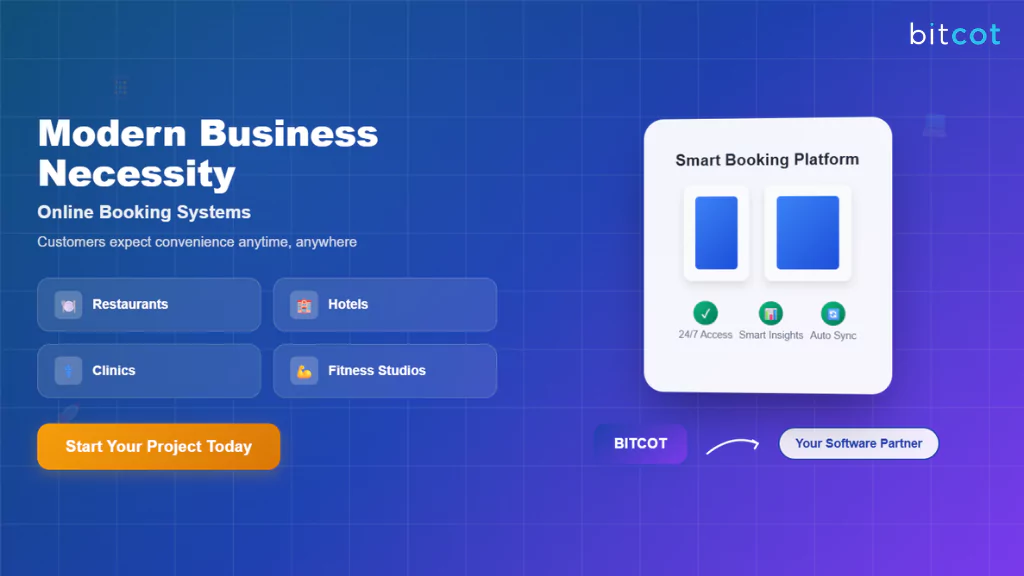
Building an online booking system is no longer just a trend; it has become a necessity for modern businesses.
Customers expect the convenience of booking anytime, anywhere, whether they’re scheduling a service in vibrant San Jose or making reservations in growing cities like Fresno and Bakersfield. Companies that fail to adapt risk losing them to competitors who offer seamless digital experiences.
Whether you run a restaurant, hotel, clinic, or fitness studio, the right system can transform how you operate. By investing in booking app development, you’re not just adding software; you’re creating a better experience for your customers. Smooth reservations and personalized service lead to repeat business and stronger loyalty.
With appointment scheduling & booking system development services from Bitcot, you can streamline reservations and gain insights that help your business grow smarter.
When paired with the right strategy and technology partner, your booking system becomes more than a tool; it becomes a growth engine.
Contact us today to start your booking software development project and build a smarter future for your business.



